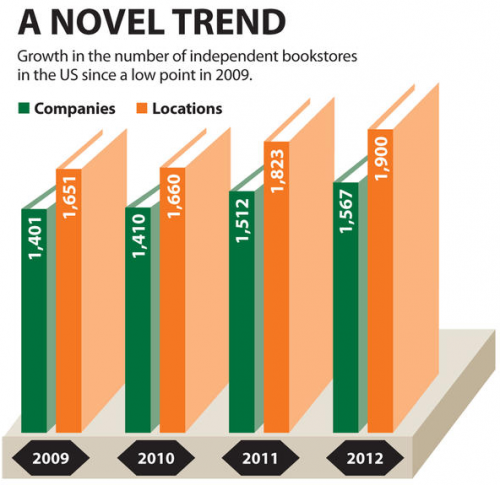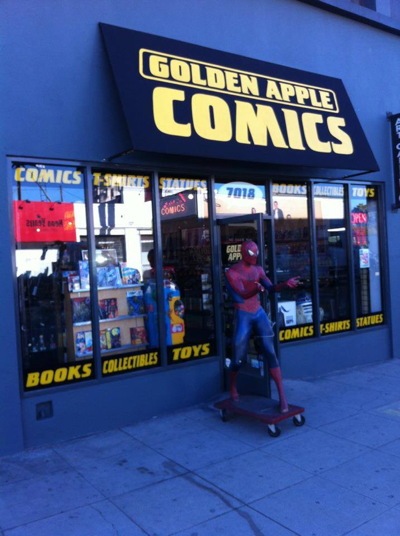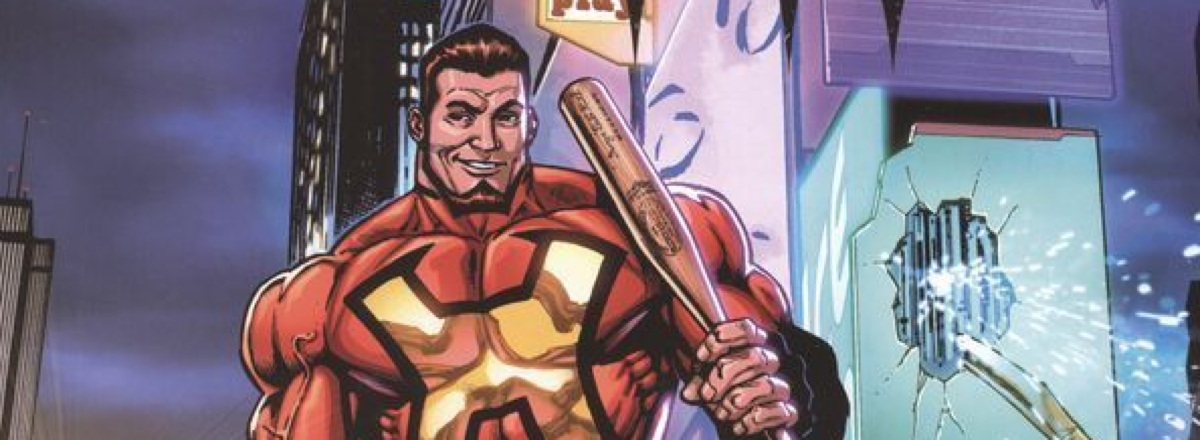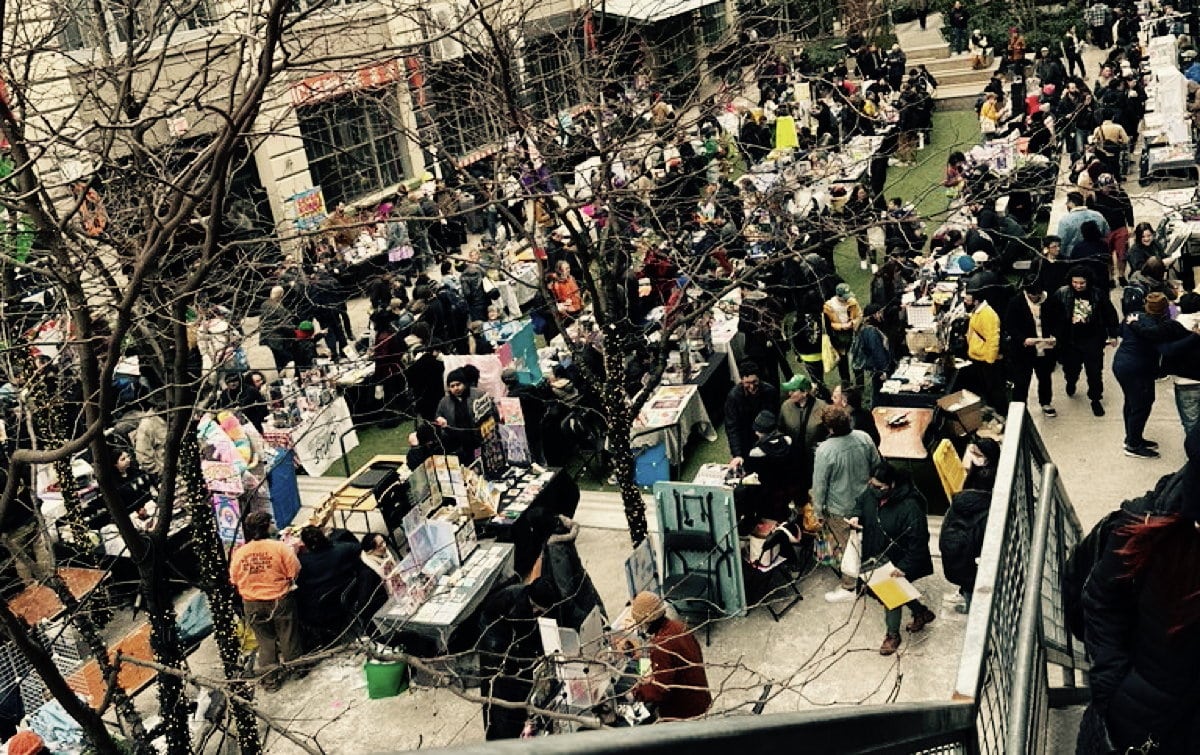Speaking of Amazology, Lauren Davis at io9 got right to the darkest conspiracy theories of all with a post titledWill Amazon Do To Comic Shops What It Did To Book Stores? Amazon is generally considered to employ a Genghis Khan like strategy in seeking to wipe bookstores off the face of the earth, however, even the comments on the above piece point out that Amazon has been more toxic to the chain bookstores than indie shops. In fact, a piece from last fall pointed out, Amazon Slayed a Negative 77 Indie Bookstores in 2012, accompanied by the above chart, showed that indie bookstores are hanging in there.
While the New York Times has been announcing the end of Manhattan as a paradise for bookstores—and painful closures like Rizzoli Books, Shakespeare & Co. and St Marks Books have left great sucking chest wounds for Manhattan booklovers—luckily indie bookstores are slinging to life in the wake of insanely surging rents. :
But alarmist rhetoric aside, it was a familiar tale: Not about the end of reading, but about New York real estate — inexorably rising rents and the few businesses that can afford them. It’s a challenging landscape for anybody, but probably especially challenging for bookstores after all. The same Department of Labor database the Times cited, showing a nearly 30 percent decline in Manhattan bookstores between 2000 and 2012, also found Brooklyn actually gaining a bookstore (from 50 to 51) in the same period. Look closely at a few of those — as well as Manhattan’s hardiest survivors — and the city’s Darwinian, post-Bloomberg ecosystem begins to look less like a literary desert than a harsh but productive driver of bookstore evolution. Here’s how a few of the success stories have managed.
Getting back to Davis’s original question about Amazon and comics shops, the survival—best sales EVER for some— for local comics shops has to be seen as part of the pattern of the indie bookstore revival. As I’ve said many, many times, if you offered the publisher of any kind of book genre a dedicated network of 2000 stores all tirelessly devoted to selling your product — they would leap at the chance. The above profile of local NYC indie bookstores didn’t include a single comics shop, which is a little surprising to me—although five of the six have held graphic novel events. Maybe it’s time for some general rebranding here?As for the survival of comics shops, specifically, Davis write:
But as with prose books, not everyone is going to want to make the switch from paper to digital. Some people simply prefer the experience of reading on paper, and many folks collect single issues of comics—although it will be interesting to see if the latter changes with the rise of digital comics. And there’s a social aspect to comic book stores that is distinct from what you see in a bookstore. The weekly ritual of going to the shop on Wednesdays to discuss the latest issue with your fellow readers won’t be replicated by the mere availability of digital comics. Still, it will be interesting to see what Amazon plans to do in the digital comics space and how retailers feel about the purchase.
Although Comixology’s retailer services—including pull lists and digital storefronts—will remain in place, at least one retailer, The Golden Apple’s Ryan Leibowitz, sees an Amazon-driven Comixology as MORE useful:
The fact is, Amazon is more retailer friendly (sort of). What I mean is that their whole platform is based on businesses and individuals to have hosted webstores that they take a cut from. We already have an Amazon Webstore and my hope is that they integrate our Comixology Digital store to it. And unlike Comixology, We keep the purchased amount from the customer (minus the Amazon fee) not the other way around like Comixology does currently.
Also, comic books are not like CDs and/or regular prose books, they are collectible. What I mean is that they have value and are meant to be collected, cherished and enjoyed for generations. i don’t see comic shops falling over like bookstores without a geek fight…with lightsabers!
Above, the Golden Apple in Los Angeles, CA, via FB










I spend about half the year living in Brooklyn and the other half in various cities and I’m just not seeing this to be true, unless we really stretch the term “bookstore.” It seems to me outside of really huge cities like NYC, Chicago, SF, Dallas, and LA, indie stores are just dead. I dunno, maybe it’s all in the Pacific NW?
“…and painful closures like Rizzoli Books, Shakespeare & Co. and St Marks Books have left great sucking chest wounds for Manhattan booklovers…”
Manhattan bibliophiles have certainly been dealt a few blows with closures of beloved stores, but as a bit of a digressive nitpick: I don’t think St. Marks Books has closed. It’s apparently in the process of finalizing a lease for a new/different location, and is in the midst of an Indiegogo campaign to raise funds to help finance the move. It may be reeling from the blows landed upon it. It might not last to hear the next bell or, frankly, get through the next round, but it ain’t dead yet.
Also, I don’t think Shakespeare & Co. is yet closed, tho’ the situation there isn’t terribly rosy, apparently facing a massive rent hike.
The rent question (as well as the Amazon store issue) is an interesting one to look at. I’ve seen a noticeable rise here locally (in the South Jersey suburbs of Philadelphia, for reference) along Main Street areas) since the economy started coming back of new indie bookstores — both first-run and used — especially since the final collapse of Borders.
The number of local comic shops have remained constant except, once again, two that have moved over rental issues over mall locations changing use of space. Even with the rise of digital comics, they all seem to be still doing at least as well as before, especially with a diversified product (the shop I visit, for example, mainly pays its bills as a MtG sales & tournament hub). At least two that I know of have spoken of expanding to second locations (albeit smartly focusing on separate products within a larger brand at a second store).
The doom and gloom seems hardly warranted. And even the issues of closures seem to be mainly based in the large (and overly-expensive, often over-exposed) urban environments that the publishing and comics press has been centered upon. I point to the case that even five miles outside of an urban center, I can point to evidence that supports the statistics given here, yet seems to surprise the popular press narrative on a ‘collapsing bookstore market.’
comic shops have a responsibility to keep themselves relevant and adapt to the times. In my city we have 8 comic shops, and only 2 have websites. They’re both horribly out of date (1998 era with frames and gifs!) and not close to being contemporary. Besides hiring a community college web developer student to put up a decent wordpress eCom site, there are TONS of low cost tools and services out there nowadays to help small businesses create websites. Maybe you’d need a small business loan to build a website. Invest in your business and help yourselves!
How many comic shops are actively using social media to engage and attract new customers? (I mean like talk to people and real engagement) How many are active in their communities putting on events and making your shop a destination? There is so much that can be done besides unlocking the doors and turing on the lights.
I’ve seen a ton of great indie stores thrive, but they’re all really cool places, with a destination vibe and have a strong web presence. The tools are out there.
Comic book stores do not see themselves as specialty bookstores, although most rely on comic book sales as a majority of revenue.
Two bookstores in Manhattan saw their rent rise, and found locations a block away. JHU Books, and Forbidden Planet. They survive because customers come in every Wednesday to get new titles. Bookstores never promoted this, even though every major bestseller has a strict on-sale date of Tuesday.
As for comic books (the periodical) being collectible…
What happens when the readers stop collecting the fetish object.
If one can watch porn for free online, why buy the DVDs? (And yes, the Internet has decimated the adult film industry.)
If one is reading digital comics, why buy a paper issue?
If Amazon is selling 99-cent comics, why pay cover price from a retailer (in paper or digital)? Why buy a trade collection when the single issues/chapters are readily available in one’s library?
Wow… Golden Apple only has 54 items in its Amazon store. (And only THREE graphic novels for sale on its store website. This from one of the most venerable comics shop in the country?!?)
With the Amazon website, I can search to see if an item is cheaper from another retailer. Were I a comics retailer on Amazon like Golden Apple, I’d set up an algorithm to undercut every other retailer by a few cents. If it’s rare, then you set up the reverse… raise it a few dollars if there are only two vendors selling copies.
But I wouldn’t be. Why let Amazon into the henhouse? Didn’t retailers learn anything from Borders? (Guess who ran Borders’ website!) Amazon sees those sales IN DETAIL, can run the statistics, profit-and-loss, and other variables, and undercut the retailers online with the next volume or related product. THEY CAN EVEN MARKET DIRECTLY TO THE PERSON BUYING THE PRODUCT.
“Hey… Nadir Comics is selling a lot of copies of Sensational Detective Comics! We should get in on that action!” (Most likely with an exclusive variant cover SIGNED by the artist. Why wouldn’t a publisher sell 5,000 more non-returnable copies to a retailer?)
Or, “Mr. Emptor, you recently bought Article Adjective Noun. You might be interested in titles by the same author. Click HERE to save 20% off selected titles by the same author.”
Seriously… Amazon/Comixology is the biggest event for retailers since Marvel purchased Heroes World Distribution.
“Were I a comics retailer on Amazon like Golden Apple, I’d set up an algorithm to undercut every other retailer by a few cents.”
Working for a company that sells comics in stores (but not really online) but does sell tons of other items on Amazon, trust me that the Amazon system is a lot more complicated than this and with anything related to things they sell, you are always subject to Amazon’s rules about merchandising and the buy box on their own site. The rules are all set up for Amazon’s benefit and not so much on other sellers.
Comments are closed.